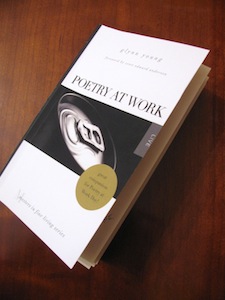You never know where you’ll find poetry at work.
It was one of those conversations that start on one subject and somehow extend into another subject and then become something entirely different. In this case, a conversation with a secretary on a simple work assignment grew into a discussion about the value of people regardless of their position and then into the inherent value of all work.
It was a moment of poetry at work.
I can’t recall what the specific work assignment was, but it was likely something to do with the company employee magazine (that’s the group she was working in). What prompted it was that she said something self-denigrating about her work: “I’m just a secretary.”
“You’re not just a secretary, ” I replied. “You’re important. And you have inherent value, regardless of what you do for the company or any other organization.”
She looked perplexed, so I said, “You have the same inherent value as a human being as the CEO has.”
“Oh, ” she said, “I don’t believe that. A CEO is more valuable than I am.”
I shook my head. “Not inherently. People have different skills, talents and abilities, and some of those are more valuable than others, but the people themselves have the same inherent value and worth.”
She still disagreed, but I could see she was intrigued, so I plowed on.
“If people didn’t have the same inherent value, why do we get so upset then reorganizations happen, people are laid off, but senior managers are never affected? Isn’t that an organizational expression of your belief that we have different values?”
That captured her attention. She was quite outspoken on the perceived unfairness of reorganizations and layoffs.
“I’ll go one more step, ” I said. “While society, and particularly a capitalist society, values some kinds of work as more important than others, the fact is that all work has an inherent dignity, an inherent sameness of value and worth. All work is good.” And then I thought a moment. “Well, perhaps not all work.”
“Aha!” she said, believing I had tripped myself up.
“Some work, ” I said, “is degrading. Like selling drugs, and prostitution. But then it’s not really work, is it? It’s more like slavery.”
I don’t think I ever convinced her. But our short conversation shook enough of her preconceived notions about people, work and the value of both. She even began to look at her own work differently, and came to understand that it was important, even if it was “just secretarial work.”
A number of poets have struggled with this idea, and one of the best expressions of it is “Filling Station” by Elizabeth Bishop (1911-1979). Bishop describes what is clearly dirty work in a clearly dirty workplace, and then sees a begonia and a doily.
Filling Station
Oh, but it is dirty!
—this little filling station,
oil-soaked, oil-permeated
to a disturbing, over-all
black translucency.
Be careful with that match!
Father wears a dirty,
oil-soaked monkey suit
that cuts him under the arms,
and several quick and saucy
and greasy sons assist him
(it’s a family filling station)
all quite thoroughly dirty.
Do they live in the station?
It has a cement porch
behind the pumps, and on it
a set of crushed and grease-
impregnated wickerwork;
on the wicker sofa
a dirty dog, quite comfy.
Some comic books provide
the only note of color-
of certain color. They lie
upon a big dim doily
draping a taboret
(part of the set), beside
a big hirsute begonia.
Why the extraneous plant?
Why the taboret?
Why, oh why, the doily?
(Embroidered in daisy stitch
with marguerites, I think.
and heavy with gray crochet.)
Somebody embroidered the doily.
Somebody waters the plant,
or oils it, maybe. Somebody
arranges the rows of cans
so they softly say:
ESSO-SO-SO-SO
to high-strung automobiles.
Somebody loves us all.
From The Complete Poems 1927-1979, by Elizabeth Bishop)
In the midst of all that dirt and grease and filth is a flowering begonia, and a doily, reminders that beauty, and poetry, exist in all work.
Related:
Poet Justin Price has a good analysis of “Filling Station” at Hub Pages.
Image by Beadmobile. Source via Flickr. Post by Glynn Young, author of the novels Dancing Priest and A Light Shining, and the just-published Poetry at Work (T. S. Poetry Press).
Buy the book Poetry at Work
Celebrate Poetry at Work Day
_____________________________

Visit the official Poetry at Work Day poster page to order
_____________________________
Poetry at Work, by Glynn Young, foreword by Scott Edward Anderson
“This book is elemental.”
—Dave Malone
- Poets and Poems: Sandra Marchetti and “Diorama” - April 24, 2025
- Poets and Poems: Christina Cook and “Roaming the Labyrinth” - April 22, 2025
- Longfellow’s “Paul Revere’s Ride”: Creating a National Legend - April 17, 2025

David Rupert says
Glynn this is really enjoyable. Love your interaction with the secretary.. and the filling station. Nice!
Glynn says
David – thanks so much for reading it.
Mary Sayler says
Good article, Glynn. I’d only read a bit of it when I thought about Elizabeth Bishop’s poem, and then, there it was! Cool.
Glynn says
Mary, with me, it was the other way around. I had the poem, and was looking for the right photo, and then — bam — there it was. Thanks for the comment.
HisFireFly says
yes, yes, yes! Somebody loves us all!
Glynn says
Thanks, Karen. Maureen (below) liked that last line, too.
Maureen Doallas says
Did you share that poem with the secretary, Glynn, or write a poem about her work?
Love the last line of the Bishop poem.
Glynn says
Actually, at the time this happened, I was only reading poetry, not writing it.
I loved that last line, too.
Megan Willome says
I did not know that poem, Glynn. Thank you! I love stuff like that.
Glynn says
Megan, I knew it, but hadn’t read it in a long time. Thanks for reasding and commenting.
Laura Brown says
I love E. Bishop, and this is one of my faves, partly for the touch of humor.
A friend of mine once explained to an employee how his photocopying tasks fit into the larger picture of the office’s work. Once he understood it was as important as the stuff he thought was really important, it changed his dedication to his job and the pride he took in doing it well.
Laura Brown says
Food Service
The overseer of meats
at Mehlman’s Cafeteria
would plate a slice of meatloaf
when he saw my brother in line.
The morning window woman
at Community Bakery
knows without asking: cinnamon
doughnut, coffee with cream.
When the angry woman in the wheelchair
sends back her eggs on Christmas Eve,
the night manager who remembers
I had a blueberry waffle last time
cracks two in a bowl, takes
the whisk from the cook
and beats ’til fluffy, teaching,
“This is how she likes them.”
Glynn says
Laura – that’s delightful. Thanks for sharing it with us.
Laura Brown says
Thanks, Glynn. But I started mentally revising and wanted to pluck it back about 7 seconds after hitting Submit. That’s normal, right?
Dolly@Soulstops says
Still lovely, Laura 🙂 and yes, normal (reply to your second comment)
Tania Runyan says
What a lovely, compassionate poem, Laura. I like how the couplets lend to the sense of balance that all these important, often invisible, people give to our lives.
Dolly@Soulstops says
Glynn,
I appreciate you took the time to encourage another person…wonderful…thanks for sharing the poem.